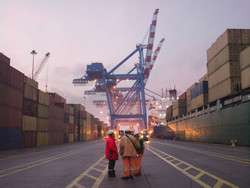Logistics is about speed, security and traceability. In a fast-changing marketplace, small and medium-sized enterprises (SMEs) can have a hard time competing with major players who have the resources to adapt quickly to new technologies that offer ever-more enhanced efficiencies.
The EU-funded LOGICON project, which was completed in August 2015, sought to level the playing field by testing and facilitating the adoption of low-cost, low-barrier technologies specifically targeted at Europe's smaller firms. These innovative tools include an easy-to-access communication platform for intermodal transport collaboration; apps and smart devices to support service information exchange; and an online marketplace where SMEs can offer their transport services to prospective clients.
Project activities were carried out in four countries addressing the key challenges of: enabling connectivity for SMEs acting in the logistics market; engaging communities (either cargo communities around port and inland terminals or business networks); and preparing for cooperation in a global freight ecosystem.
In Poland for example, an innovative communication platform for intermodal transport collaboration was established. This enables information sharing among all parties involved – logistics operators, rail carriers and container terminal managers. Functionalities include exchange of bookings for intermodal transport, allocation of bookings to rail wagons and exchange of loading and unloading plans. The Polish platform was developed and validated at the Baltic Container Terminal.
Project partners in the Netherlands focused on waterway transport and created low-cost dedicated apps and services to enable flexible infrastructure planning and data sharing. The apps enable barge operators and lock operators to communicate and connect to a system where real-time terminal service information is available. The technology was used and tested by Combi Terminal Twente (CTT), which operates an inland terminal in the Netherlands and provides container shipments to many European destinations.
In Spain, apps and smart devices were developed to enable truck drivers to exchange information such as truck departure and arrival times, and to create and send transport orders and invoices. The tools also enable larger transport and logistics companies to engage with SMEs, even those whose technology capabilities might only stretch to a Smartphone. This means that major players can access an external fleet of smaller logistics specialists when needed, while providing the same added value services to final customers.
Finally, the project's Italian partners delivered a web-based transport marketplace where logistics providers can sell their services and make better use of their resources. The aim of this service is to reduce both the number of 'empty miles' logistics providers waste and unnecessary emissions by ensuring that freight transport is as efficient as possible.
The overall long-term goal of the project is to make intermodal transport common practice in supply chain planning, and to encourage the adoption of intermodal transport as an environmentally-friendly and energy-efficient approach to transportation.
More information: For further information, please visit the LOGICON project website: www.logicon-project.eu/
Provided by CORDIS























